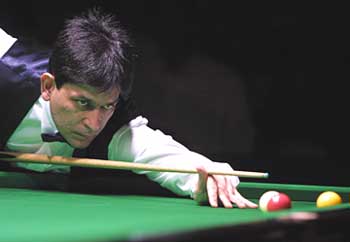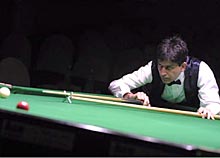Home > Sports > Interviews
The Rediff Interview/Geet Sethi
'I have never got intimidated'
October 29, 2003
In an era of unabashed showmanship, the quiet, unassuming Geet Sethi has become a legend in the world of billiards. In terms of recognition and longevity, there are few who have done better than Sethi. He has won the World Championship of Billiards an amazing seven times (1985, 1987, 1992, 1993, 1995, 1998, 2001) and, as you talk to him, you are persuaded that there are more down the line.
Sethi was Michael Ferreira's heir-apparent and his classic battles with Mike Russell are now part of billiards legend. Over the last few years, the intensity that was once Sethi's hallmark had been missing, but he now reckons he is ready to shine on the world stage again.
Ashish Magotra spoke to the former champion as he prepares for the World Billiards Championship in Hyderabad next month. Excerpts:
 During your career you have had so many triumphs, but is there any specific moment that stands out?
During your career you have had so many triumphs, but is there any specific moment that stands out?
In 1993, I was trailing Russell by 900 points at the interval. 900 points is a huge margin against any player, let alone Russell. I came back to win the World Championship. That was a very memorable moment.
Other that that, I constructed a break of 1,276 against Bob Close in the 1992 World Professional Billiards Championship, which is the world record under the three-pot rule and the highest break made in the last five decades. There are so many moments and every victory was special, but these stand out.
Billiards has always been looked upon as an elitist sport...
Popularity is a function of the game and the media, not of the players. The fact that billiards is not as popular as other sports does not bother me. But we have achieved a lot in the sport and I guess we could do a little better.
For example, Formula One is the most expensive sport in the world. A selected few take part in it. But it has so many followers in India. People may perceive billiards to be an elitist sport, but golf, which is gaining in popularity, is even more elitist and in the grasp of only the 'A' section of society.
In a bid to make billiards more popular, we are trying to introduce more colour into the game. The game is played with only three balls, one red and two white. What we are trying to do is introduce a striped ball to the game. This will enable the television viewer to see how much spin is imparted on the ball and what kind of skill is required.
We are also trying to make the games shorter so that it becomes more spectator-friendly. We had a hundred-point game format in the Asian Games.
Have you ever been intimidated by your opponent?
Intimidation does not occur by glaring at someone or by sledging, as you may call it. But you can get intimidated at times by the reputation that the player has built up over the years. Sometimes you start playing the reputation rather than the balls. But that has never happened to me. I play the game to enjoy myself. In any endeavour in life you need to enjoy yourself to be successful. You have to spend hours honing your technique and you have to work very hard and practise for long hours.
India's first world champion, Wilson Jones, passed away recently. What are your memories of him?
The passing away of Wilson Jones marked the end of an era. He inspired four generations of cueists after him and provided a self-belief for all of us. India has claimed 14 world titles after him, but no one can deny the role played by his first two triumphs.
Wilson Jones will always be remembered for being a great human being. I first met him in 1977 when he came to the Sports Club of Gujarat for an exhibition game. It was a moment that I cannot forget. He sensed my nervousness and tried to calm me. He cracked a joke and put me at ease. Later that evening, I was practising at the Ahmedabad Gymkhana and received a call from him around 9pm.
"Son, you played very well. Keep it up. I noticed that your left leg is slightly behind your right leg when you take your stance. You need to take it just a few inches ahead of your right leg." It was just a small observation, but it made a world of difference for me.
Your rivalry with Mike Russell is the stuff of legend.
Mike Russell is one of my greatest rivals and friends. We have had an ongoing rivalry for the last 13-14 years. In these years we have shared 10 world titles. I hold him in very high regard and he is a very fierce competitor on the table, giving no quarter to his opponent. I beat him in 1993 and in 1994. Those were the years when I was raising the standards. But 1996 onwards, I would say he has raised the bar to a level that the others are finding hard to reach.
 What are your views of the current lot of Indian players?
What are your views of the current lot of Indian players?
We have a lot of promising players in our midst like Alok Kumar, Nalin Patel, Devendra Joshi and Ashok Shandilya. They are all fine players, but one gets the feeling that they have developed a comfort zone around themselves. They are just not willing to work hard enough to raise the levels of their game. They may have become National champions and may win the odd tournament abroad, but to crack into the big league you need to work very hard. Much harder than their present level. They are all in the 35-40 age group and they need to start maturing and winning now or the moment will be lost.
But among all these players, I think Pankaj Advani is a real talent. He is a very hard worker, very dedicated and focused. He has a very good technique and I think he will win at least one world title, if not more.
Do you prefer spending more time in practice than in actual match play?
Sports per se is a reclusive activity. Because only in reclusion, in peace and quiet away from the world, can you really concentrate on the job at hand. You need to practise for hours and hours on your own. I used to practise six hours a day, practising to try and get my technique perfect until it was ingrained deep into my subconscious mind.
For the last 4-5 years, I must say that I have neglected my practice. I would only start practising a couple of months before a tournament and the results show. I prefer not to play, but just to spend time practising. Billiards is a sport where you compete only against yourself. So you need to spend as much time practising [as possible].
My motivation levels were admittedly down, but I find myself suddenly enthused again. When you spend 30 years doing the same thing over and over again, at times it can take its toll on your mind and body. Longevity in any sport is achieved from a combination of restraint, will power, and discipline.
Tell us something about the talk with the 40 cricket probables at the conditioning camp in Bangalore last month.
The BCCI wanted me to give the 40 probables a talk about being ambassadors of the sport, but it did not quite turn out that way.
I spoke to them of fame and of success.
Every kid in India wants to be as famous as the top cricketers. But at the end of the day happiness comes from hitting the ball on the sweet spot of the bat, it comes from performing well in the sporting arena. All the 40 probables who had made it to the camp were successful in their own right. After all they had been selected from among a billion. But it is now that their challenge really starts. If they want to become as famous as Sunil Gavaskar and Sachin Tendulkar, they need to maintain their focus, show restraint and will power. Circumstances don't allow them to focus when they need to most.
Who do you think is the best player in the world?
Russell to me is the best player in the world right now by far. For sheer proficiency in getting large breaks, there is nobody who is even close to him. Peter Gilchrist is good, but he can't churn out huge breaks the way Russell can. Russell can do it almost at will.
Billiards is a game which requires you to stay at the table for long periods of uninterrupted play scoring points and anything over 500 regularly is great.